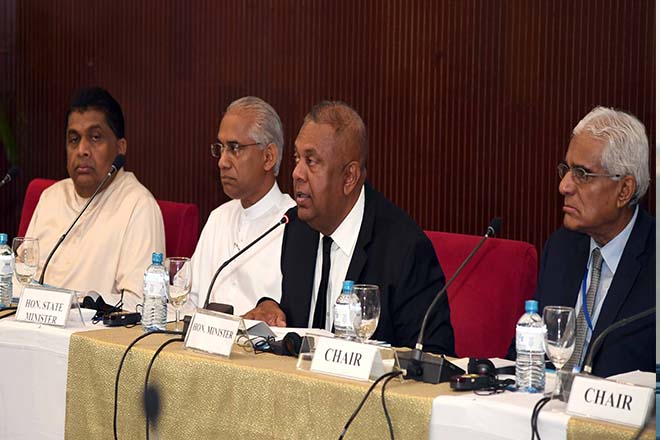Feb 27, 2018 (LBO) - Sri Lanka faces refinancing risks in the coming years and need a concerted and coordinated policy response to mitigate such risks, Finance Minister Managala Samaraweera said.
"It is clear that Sri Lanka, like many developing nations, faces such refinancing risks in the coming years. This warrants a concerted and coordinated policy response to mitigate such risks," the Finance Minister said.
"Because of a verity of impending developments in the global financial markets, the World Bank and IMF jointly formulated a new framework on
Debt Sustainability for Low-Income Countries, as announced in October last year."
This new framework, Samaraweera says will be implemented in the second half of 2018 and would help guide countries and donors in mobilizing financing for development needs.
"The new framework would help mitigate the risk of an excessive build-up of debt in the period ahead."
The minister was addressing a Forum of Finance Secretaries and Central Bank Governors of 24 developing nations in Colombo Tuesday.
The full text of the speech is below:
Opening Remarks by Hon. Minister of Financeand Mass Media
Excellencies,
Distinguished Delegates,
Ladies and Gentlemen,
- I am pleased to address this esteemed gathering as Sri Lanka hosts the G-24 Technical Group Meeting here in Colombo today.
- As the Chair of the G-24 Bureau, we are grateful to all G-24 Member Countries for extending their support to host this important meeting in Sri Lanka.
- Many of you have travelled a long way to reach Sri Lanka and perhaps some of you are here for the first time. Let me warmly welcome each and every one of you to my country.
Distinguished Delegates,
- As we are well aware, we have before us a clear mandate as the “Intergovernmental Group of Twenty-Four on International Monetary Affairs and Development (G-24)”.
- If I may reiterate, it is to co-ordinate the positions of emerging markets and developing countries on international monetary and development finance issues, with a view to ensure that our common interests are adequately represented in the deliberations of the Bretton Woods Institutions.
- With such an important mandate, this year’s G-24 Technical Group Meeting covers a very timely theme – “debt management and sustainability; and mobilizing external funds amidst tightening global financial market conditions”.
- I say it is ‘timely’ because of the following:
- The international monetary order in the near to medium-term would see a faster normalisation than previously anticipated. We have seen signs of robust recovery in advanced economies, steadily firming inflation outlook and improving labour market conditions. This suggests that policy interest rates in advanced economies would rise at a faster pace, resulting in tighter global financial market conditions.
- The IMF’s latest World Economic Outlook report issued last month state “the tightening of global financial conditions would have implications for global asset prices and capital flows, leaving economies with high gross debt refinancing needs and un-hedged dollar liabilities particularly exposed to financial distress.”
- The IMF forecasts the gross financing needs for 2018 in emerging and middle-income economies ranges from 4% to 43%of the GDP with an average of 10.4%. In many developing economies, a high proportion of this outstanding debt is held by non-residents. This creates added complexities in the policy response.
- It is clear that Sri Lanka, like many developing nations, faces such refinancing risks in the coming years. This warrants a concerted and coordinated policy response to mitigate such risks.
- Because of these verity of impending developments in the global financial markets, the World Bank and IMF jointly formulated a new framework on Debt Sustainability for Low-Income Countries, as announced in October last year.
- This new framework, which will be implemented in the second half of 2018, would help guide countries and donors in mobilizing financing for development needs. The new framework would help mitigate the risk of an excessive build-up of debt in the period ahead.
Distinguished Delegates,
- I will draw your attention to one key element of this framework. Even countries with relatively low levels of absolute debt may face repayment challenges if there are weaknesses in its economic structures and debt management institutions.
- Let me put this in perspective. According to the IMF’s Fiscal Monitor, within the group of low-income developing economies, over 90% of the countries had debt levels over 30% of the GDP as at end 2016.
- However, the average government revenue within the same group of countries is 15% of the GDP, the primary deficit is around 3% of GDP on average, and exports are dominated by primary products.
- These structural factors are not conducive to effective debt management and entails repayments risks even at modest levels of absolute debt.
- Whilst this does not mean that all such countries may face repayment problems due to structural or policy weaknesses, we can infer an important message. The current global financial context demand sour urgent attention to further strengthen our macroeconomic policies and institutions, particularly in the sphere of public debt management.
Distinguished Delegates,
- I am confident that in the coming two days you would make your fullest contributions in engaging the agenda before you. You would, I am certain, will ensure that our common interests are fairly and adequately addressed at the forthcoming Bretton Woods meetings in Washington DC.
- Finally, let me wish you every success in your deliberations at the Technical Group Meeting and a very pleasant stay in Sri Lanka. I thank you.

